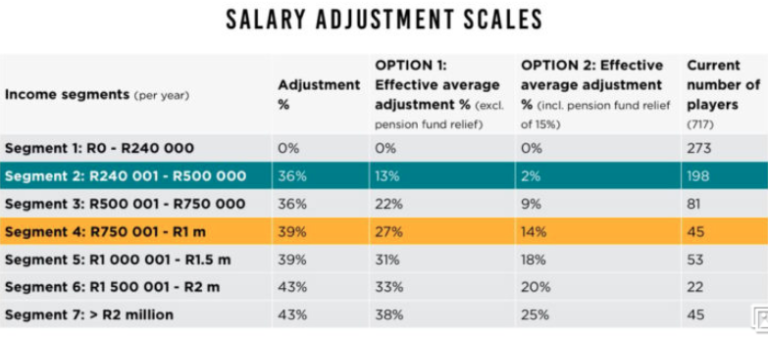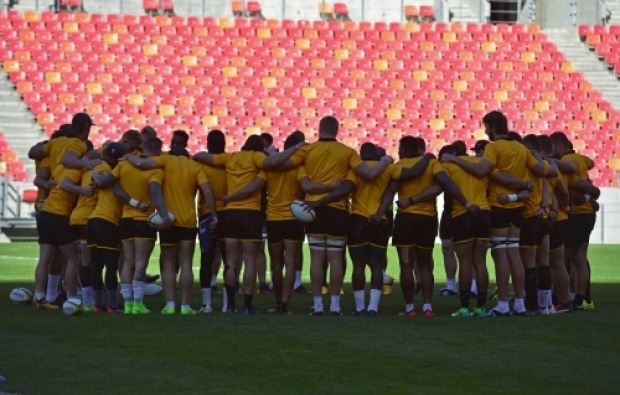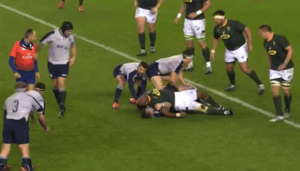A finalised deal for the SA rugby industry is set to see players contributing 12.5% to a wide-ranging plan to cut up to R1 billion from its budget over the next eight months.
According to the Daily Maverick, chief executive of MyPlayers Eugene Henning, will sign on behalf of the members this week after three weeks of discussions to reach consensus.
The final version of the deal between South Africa’s 717 professional rugby players will most likely see pay cuts start at the end of May, with the varying adjustments set to impact the wealthiest players most severely on a salary-based sliding scale.
The terms of the collective agreement were broken down into nine points:
- 95% participation of members
- Salary reductions in proportionally equal measures
- Salary reductions until 31 December 2020
- A full pension fund holiday
- A full salary reduction, not a deferment
- 21-day period to cancel contracts with immediate effect
- No discretionary salary increases or bonuses in this period
- No contracting of new employees
- In case of liquidation, a full claim against original salary
According to the clause, 95% participation was agreed upon for the collective good, and a key factor of the agreement was reportedly for administrators to also take pay reductions, while players’ commission payments to agents would reduce in line with the agreed wage cut percentage.
Further to the Daily Maverick report, its stated that players (and general employees) earning under R240,000 annually will not subject to any pay cuts, while players have also been offered pension relief.

On 21 April, the SA rugby industry agreed in principle to a wide-ranging plan to cut between R700 million to R1 billion from its budget over the next eight months.
READ: Pay cuts planned across the board
The worst-case scenario is based around the possibility of no rugby being able to take place this year. Should South Africa return to play earlier, the pay cuts until 31 December could be revised.
Rugby and Covid-19 timeline
- 11 March: Covid-19 management committee meets for the first time
- 12 March: Guinness PRO14 season is suspended indefinitely
- 13 March: World Rugby cancels the women’s HSBC World Rugby Sevens Challenger Series tournament, due to be played in Stellenbosch on 28 and 29 March
- 13 March: SA Rugby cancels Junior Springbok home and away internationals in April and May
- 14 March: Sanzaar suspends Vodacom Super Rugby for the foreseeable future
- 16 March: SA Rugby suspends all national team training camps and business travel and orders cost savings; postpones kick-off of SuperSport Rugby Challenge with a view to return to play on 25 April
- 16 March: SA Rugby announces actions and issues guidelines on safe practices to all rugby bodies
- 18 March: SA Rugby announces suspension of all rugby until the end of April and that discussions are under way to reschedule competitions to exclude international travel and be played behind closed doors
- 20 March: World Rugby cancels the Junior World Championship scheduled for Italy in June
- 23 March: President Cyril Ramaphosa announces nationwide lockdown to start from midnight on 26 March
- 24 March: IOC postpones the 2020 Tokyo Olympic Games to 2021
- 27 March: SA Rugby, MyPlayers (players’ organisation), the South African Rugby Employers’ Organisation (SAREO) and Sports Employees Unite (SEU) confirm establishment of a joint working group to manage the response to the crisis
- 3 April: The rugby industry announces progress on an Industry Mitigation Strategy (IMS) to safeguard the game’s future. Plan to go through approval processes.
- 21 April: Industry Financial Impact Plan to make significant cuts in ‘global’ South African rugby budget confirmed.





